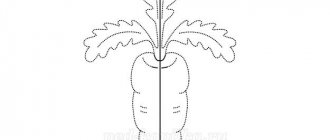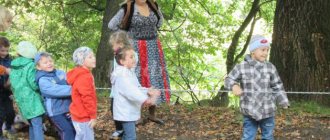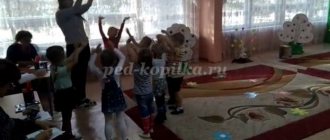At what age should preparatory classes begin?
By about 3 years of age, a child can already consciously perceive the simplest mathematical terms, so it is from this age that preparatory classes can begin. Their first stage is the introduction of the concepts “few-many”, “one-several”. After the preschooler has formed a quantitative understanding, he can begin to study numbers.
It’s worth starting with the first two ordinal numbers – one and two. It will be easier to remember them if parents give clear examples - they explain to the child that he has one mouth or nose, but there are two arms, legs, ears, and eyes. This will not only make it easier for the baby to remember the numbers presented, but also easier to learn how to compare them with the number of objects. Later, using the same principle, it is worth studying all other numbers within ten.
Despite the fact that learning numbers and ordinal counting does not seem like a difficult task, even such basic mathematical knowledge must be instilled correctly. Let's look at the most basic recommendations that you should follow.
What to pay attention to - tips for parents
Children of preschool and primary school age do not yet have a high level of perseverance and attentiveness, and therefore long and boring classes are not suitable for them. In addition, if the child is not interested in studying, then this affects both the quality of learning the material and the desire to study in the future. Therefore, in order not to overtire the child and reduce his motivation, it is better to use a game approach to learning. It will allow the preschooler to be involved in the lesson process and make the lessons fun.
In addition to the learning format, you need to monitor how the child compares his knowledge with the general picture of the world. If he studies numbers, then you need to ask him where he can see them in everyday life (on a calendar or watch dial, on TV, in a book, and so on). If a preschooler is learning the concepts of “right-left”, “higher-lower”, then you need to ask him simple questions about spatial orientation: “is the table to the right or left of you?”, “Who is taller - me or you?”
Similar examples of tasks are suitable for children under 5 years old and will help develop their skills. For future first-graders it is worth choosing other, more complex exercises.
Math assignments for school preparation
It is advisable that a first-grader already has developed certain mathematical knowledge, and it is their development that time should be devoted to before school:
- ordinal counting: from 1 to 20 and back.
- knowledge of what numbers look like, the ability to identify them by appearance.
- arithmetic operations: addition and subtraction within 10.
- ability to identify simple geometric shapes: circle, oval, square, rectangle, triangle.
- ability to navigate in space: knowledge of the concepts “right-left”, “more-less”, “higher-lower”.
To fully prepare for school in mathematics, there will be enough tasks aimed at developing all the skills presented above. However, when teaching children 6-7 years old, it is especially important to follow some rules, and first of all, this concerns the sequence of presentation of the material.
Wanting to teach their son or daughter a wide range of skills, parents often jump from one topic to another. Because of this, the kids themselves get confused, and preparation does not bring the desired result. Another common problem is the desire of adults to teach a preschooler the basics of mathematics as quickly as possible. In this case, he does not have time to fully consolidate the material and understand it properly.
To make preparation for school effective, you need to take into account the age characteristics of preschoolers. This is not always possible without the help of professional teachers, so it is better to prepare for 1st grade in preparatory courses, and at home simply repeat what you have already learned.
Assignments for first-graders in mathematics:
Mathematical tasks can be not only educational, but also bright and varied. These math exercises will help your children master the basic math skills needed for 1st grade. They are presented in a playful way, which promotes exciting learning for first-graders. In this non-boring form of learning, children will learn simple mathematical operations and understand that mathematics can be very interesting.
trace and color the pictures
Give your first grader a task: create a dotted line drawing and then color it. The complex also offers templates for writing out various figures.
find 2 identical pictures
The task “Find two identical pictures” is a way to develop attention and perseverance. The essence of the exercise is that among 6-8 very similar pictures, the child should identify two that are absolutely identical. It is worth explaining to the child how to perform the test: sequentially compare each picture, notice small details and identify two that are identical in all respects.
solve the examples and put the signs: >, <, =
In this section you will find a dozen useful examples with colorful illustrations and coloring pages that will help first-graders master equation solving skills.
come up with a problem statement and solve it: addition
Writing simple math problems helps first-graders develop language and abstract thinking. With the help of a teacher or parents, the child learns to identify such components of a task as the condition, the question posed, the solution and the preparation of an answer to it.
come up with a problem statement and solve it: subtraction
It is convenient to compose the skills of composing subtraction problems using ready-made cards with answers for control. It is easy for a child to understand the essence of the picture and solve the problem.
repeat the drawing dot by dot
Fine motor skills of still clumsy children's fingers need constant training. In addition, motor skills largely influence the development of the brain, especially the center responsible for speech and thinking. Suitable exercises for developing these skills are copying a drawing according to the proposed template.
connect the figures
Tasks on creating figures according to a given algorithm are intended to develop figurative and logical thinking in a child. At first, offer the first grader simpler options, gradually complicating the task.
solve a logical thinking problem
These are simple logic problems, the solution of which involves drawing arrows. For example, using arrows you need to connect interconnected objects (an animal and its house, an example and an answer to it), restore the order of numbers, or divide objects into groups.
Draw arrows from 1 to 10.
Match the example with the correct answer.
How to choose preparatory courses?
When choosing courses, parents need to study reviews of the schools or additional education centers where they are conducted. It is important to understand how children are taught, according to what program, with the help of what textbooks and manuals. The speed of adaptation to academic loads and the performance of a first-grader will depend on the level of preschool preparation, which is why it is so important to choose proven classes.
An example of this is the school preparation courses from the AMAkids Academy for the Development of Intelligence. They provide broad subject training: they teach the basics of mathematics, develop reading skills, and instill knowledge of the surrounding world. Classes are conducted in a gaming format using educational games on an educational platform. Thanks to this approach, students do not get tired of classes, as they learn while playing. Sign up for preparatory courses from AMAkids and start preparing for school now!
Mathematics in kindergarten
Mathematics in kindergarten begins in the second junior group, where they begin to carry out special work on the formation of elementary mathematical concepts. Mathematics for preschoolers is usually included in the traditional development program in kindergarten.
Preschoolers’ mastery of mathematics plays an important role not only in preparing for school life, but also for developing logical thinking skills, developing intelligence and understanding.
The section of the site on mathematics in kindergarten for different groups contains many interesting publications for educators on teaching children on various topics:
- Fun for children in the middle group in mathematics
- Summary of the educational activity “Entertaining Geometry” for children of the senior group
- Lesson on the development of elementary mathematical concepts in children of senior preschool age with mental retardation in kindergarten
- Summary of a mathematics lesson at a preschool educational institution
- Lesson on the formation of elementary mathematical concepts in the middle group
- Summary of direct educational activities on the formation of elementary mathematical concepts “Journey to the Land of Logic” preparatory group for children with disabilities
- Mathematics lesson in kindergarten “Cognitive development” on the topic Number 6
- Abstract lessons in mathematics in the 2nd junior group on the topic “Visiting forest animals”
- FEMP “Comparison of numbers 1 and 2, 2 and 2” in kindergarten
- Educational activities in mathematics in kindergarten on the topic “Journey to the land of mathematics”
- Summary of a mathematics lesson on the topic “Journey to a Fairy Tale” in the senior group
- Complex thematic planning for the section on the formation of elementary mathematical concepts of the educational field “Cognition”
- Scenario for a lesson on the formation of elementary mathematical concepts, middle preschool age
- The number line as a means of teaching preschoolers arithmetic skills
- Summary of direct educational activities in mathematics in kindergarten “Consolidating knowledge about numbers 1, 2, 3, 4, 5 Correlating numbers with numbers”
- Lesson for the preparatory group of kindergarten “A fun trip to the country of Mathematics”
Mathematics for young children is quite a complex science, which can cause difficulties while studying at school. In addition, not all children have a mathematical mind, and not all have a natural attraction to the exact sciences. Therefore, developing a preschooler’s interest in mathematics at an early age will greatly facilitate his learning at school. After all, the modern school curriculum is quite rich and far from simple even for a first-grader.



